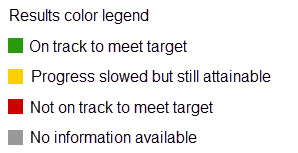Average Response Time to Police Priority 1 Calls
Desired Result: Below Target

Analysis of Performance
As of Q4 2021, the Target was lowered from 5 minutes and 30 seconds to 5 minutes and 15 seconds.
- This is a quarterly metric, currently reflecting Q1 2025 data.
- Q1 2025 data shows an average response time to Priority 1 calls of 5:05 minutes, below the target of 5:15 minutes. This suggests effective resource allocation and efficient time management.
- We will continue to look for methods to evaluate the effectiveness of our resources. Response time, measured in minutes and seconds, provides a framework to do this.
- A daily review is performed for any Priority 1 calls and a monthly reconciliation is also conducted. These allow us to evaluate the data integrity and more closely examine any unusually long response times.
- Specialty unit personnel supplement Patrol shifts for better staffing and supervisors are guiding the efficient use of time on calls to maximize officer availability
- Q1 2025 saw a higher volume of P1 calls than other quarters. At least one weapons-related call had an unusually long response time (10+ minutes), which significantly skewed the data. We’ll take a more proactive approach in future analyses to identify and account for such outliers early on.
Metric Definition
This measure represents the average response time to Police Priority 1 calls. Priority 1 calls make up less than 1% of the overall calls for service, however, these are the highest priority of call, one that is an immediate threat to life, a felony-in-progress call, or a call where a weapon is being used. This time is measured from the time the call is received to the time the officer arrives at the scene.
Why Is This Important?
Emergent response is a primary function of police. Response times need to be adequate and reasonable to satisfy this primary function.
City Organization Impact on Performance
High – Emergent response is a primary function of police. Having adequate resources, strategic deployment of those resources and maintaining reasonable geographic obligations greatly impacts response times.
Benchmark Information
Benchmarking in progress